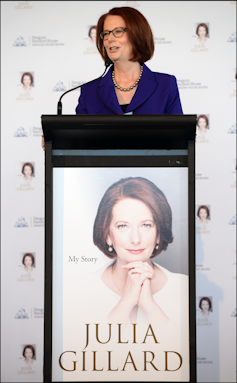How removing parenting payments when children turned 8 harmed rather than helped single mothers
- Written by Kristen Sobeck, Research Fellow, Tax and Transfer Policy Institute, Crawford School of Public Policy, Australian National University

As the government weighs up whether to extend single parenting payments to parents of children older than the present cutoff age of eight in this week’s budget, new information has come to light about what happened when the rules were tightened in 2013.
When then-Treasurer Peter Costello[1] reduced the cutoff age from 16 in 2006, forcing single parents who hadn’t found work onto (much lower) unemployment benefits, he said it would “help them with higher incomes and better participation in mainstream economic life”.
A few years later when then-Prime Minister Julia Gillard[2] announced plans to remove a loophole that had allowed some parents with children over eight to continue receiving the payments, her treasurer Wayne Swan said it would “encourage re-entry into the workforce”.
Did the cutoff improve or harm lives?
Only now does recently available administrative data[3] allow us to evaluate how single mothers fared after losing the payment when their children turned eight. Did they secure employment? Did they get higher incomes as a result of being pushed into work, or did their incomes sink?
Research Bob Breunig and I conducted on the changes enacted in 2013 finds that when taken together, the single mothers (they were overwhelmingly mothers) lost income[4].
On one hand, the change shifted a sizeable minority (about one-third) of single mothers off income support and into employment, boosting their incomes.
On the other hand, it left the majority on income support and on lower incomes – an effect that overwhelmed the increased incomes for those who left the payment and found jobs.
Multiple barriers to returning to work
What differentiates the (reduced income) majority from the (increased income) minority? While our particular dataset cannot identify characteristics that distinguish them from each other, there are two likely explanations.
First, individuals who have been on income support for long times tend to face multiple barriers to getting back to work, including illness and/or disability. In the case of single mothers, that illness or disability can also apply to their children.
Second is something more pernicious: domestic violence.
A personal safety survey conducted shortly after the Gillard changes found 60%[5] of single mothers who had ever had a partner had experienced partner violence in their lifetimes – an astonishingly high[6] figure.
If domestic violence underlies welfare dependence among single mothers (and it likely does), it doesn’t take rocket science to appreciate the difficulty of getting those mothers into work.
Single parents face greater financial constraints relative to dual-income households and greater constraints on their time, in terms of school pick-ups, drop-offs, sick days and things such as help with homework.
Domestic violence tightens these constraints, adding to demands on time and resources the need to find safe lodging, attend court hearings, and especially, as victims of trauma, care for their own (as well as their children’s) mental and physical health.
The trauma engendered by domestic violence can also be very difficult to escape when it is triggered at every custodial hearing, divorce proceeding, non-custodial parental visitation or on the days child support payments are due.
So what are the policy solutions?
First, increases in employment, unaccompanied by increases in income, appear to have deleterious impacts on children[7]. Insofar as mutual obligations lead to unstable and poorly remunerated employment, they are counterproductive and detrimental.
Our research shows that additional mutual obligations did little to improve the employment outcomes of single mothers.
Second, individuals facing multiple barriers need tailored support that identifies and helps address multidimensional challenges.
The effect of domestic violence is hard to pin down
Scaling up individualised support can prove challenging, which is where case management experiments at the local level can help. The new treasury evaluation unit[8] will be in a good position to ensure these policies are designed to be evaluated and assess their results.
As importantly, we need to be able to measure the impact of domestic violence on the economic security, employment and health outcomes of survivors and their children over time, as is done in countries like Finland[9].
Read more: Already badly off, single parents went dramatically backwards during COVID. They are raising our future adults[10]
The datasets needed to do this in Australia already exist, but so far the government has not allowed the linkage of longitudinal data on domestic violence and labour market outcomes.
Without the information that would come from putting these datasets together, Australia risks introducing policies, including those designed to assist single mothers who are victims of domestic violence, without a means of evaluating their effectiveness.
Single mothers – whether in paid employment or not – are among the hardest-working members of our society. They deserve better.
References
- ^ Peter Costello (archive.budget.gov.au)
- ^ Julia Gillard (cdn.theconversation.com)
- ^ administrative data (www.abs.gov.au)
- ^ lost income (www.dropbox.com)
- ^ 60% (www.abs.gov.au)
- ^ astonishingly high (www.violenceorpoverty.com)
- ^ deleterious impacts on children (onlinelibrary.wiley.com)
- ^ treasury evaluation unit (www.smh.com.au)
- ^ Finland (www.washingtonpost.com)
- ^ Already badly off, single parents went dramatically backwards during COVID. They are raising our future adults (theconversation.com)
















